
Speaking with democracy activists recently from Hungary and Poland, former President Barack Obama warned about the “rising wave of authoritarianism sweeping the globe,” even in countries once believed unsusceptible to an erosion of liberties.
“We’re seeing politicians target civil society, undermine freedom of the press, weaponize the justice system,” Obama went on. “And no one is being spared. Even countries that thought they were immune from wholesale assaults on democracy now understand that we’re all part of one struggle.”

Obama didn’t mention his successor by name. But he’s taken an outspoken posture against President Donald Trump throughout a series of public appearances this year, amping up his criticism of Trump’s second term and expressing concern about the state of American politics.
The panelists Obama spoke with at an event last month previously participated in the Obama Foundation’s young leaders program. They were Sándor Léderer, who co-founded an anti-corruption watchdog ground in Hungary; Stefania Kapronczay, who until recently served as co-director of the Hungarian Civil Liberties Union; and Zuzanna Rudzinska-Bluszcz, who served as the Deputy Justice Minister for Poland from December 2023 to August 2025.

“I’ve become increasingly concerned about the rising wave of authoritarianism sweeping the globe,” Obama said in a video introducing the conversation, which took place in London.
The comments were a veiled, if clear, rebuke of not only the current US administration but also some of the leaders Trump has aligned himself with since taking office.
Hungary’s Prime Minister Viktor Orbán is a champion of what he calls “illiberal democracy,” and is often credited with inspiring Trump’s playbook for government. Orbán has become a darling to MAGA conservatives, and the president has praised him as a “very great leader” and “very strong man.”
In Poland, meanwhile, a firebrand aligned with the right-wing populist Law and Justice party narrowly won the country’s presidential election in June, a political upset that could torpedo the centrist government’s efforts to unspool the legacy of authoritarianism in the country.

Trump has tried to deploy military assets to Democratic-led cities against their leaders’ wishes, urged the Justice Department to bring indictments against his political rivals and lashed out at judges who attempt to block his actions.
Obama didn’t raise any of those examples specifically. But he pointed to promises — empty ones, in his view — offered by politicians to “go back to the way things were” that hewed closely to Trump’s “Make America Great Again” message.

At the same time, the former president offered an acknowledgment that sclerotic bureaucracies and unresponsive politicians had, in many ways, ushered in a global populist wave.
“In the United States, for example, there will need to be laws that are changed so that action can be taken more effectively, more quickly to respond to problems in a lawful way,” Obama said during his discussion. “I think what we’ve seen is that when people are frustrated, they’re willing to take any action, even if it’s unlawful, because at least there’s a sense of, something’s happening. That’s something that I think everybody has to internalize at this point.”
He acknowledged that centrist politicians had, in many instances, lost the pulse of voters and allowed some of the populist anger to take hold.
“A big challenge is that the governments themselves, whether center-right or center-left, were losing touch with people and weren’t delivering on some of the basic hopes and dreams of people, so you get frustrated with government, period,” he said. “That obviously then opens the door for right-wing populism, anti-immigrant sentiment, anger, grievances.”
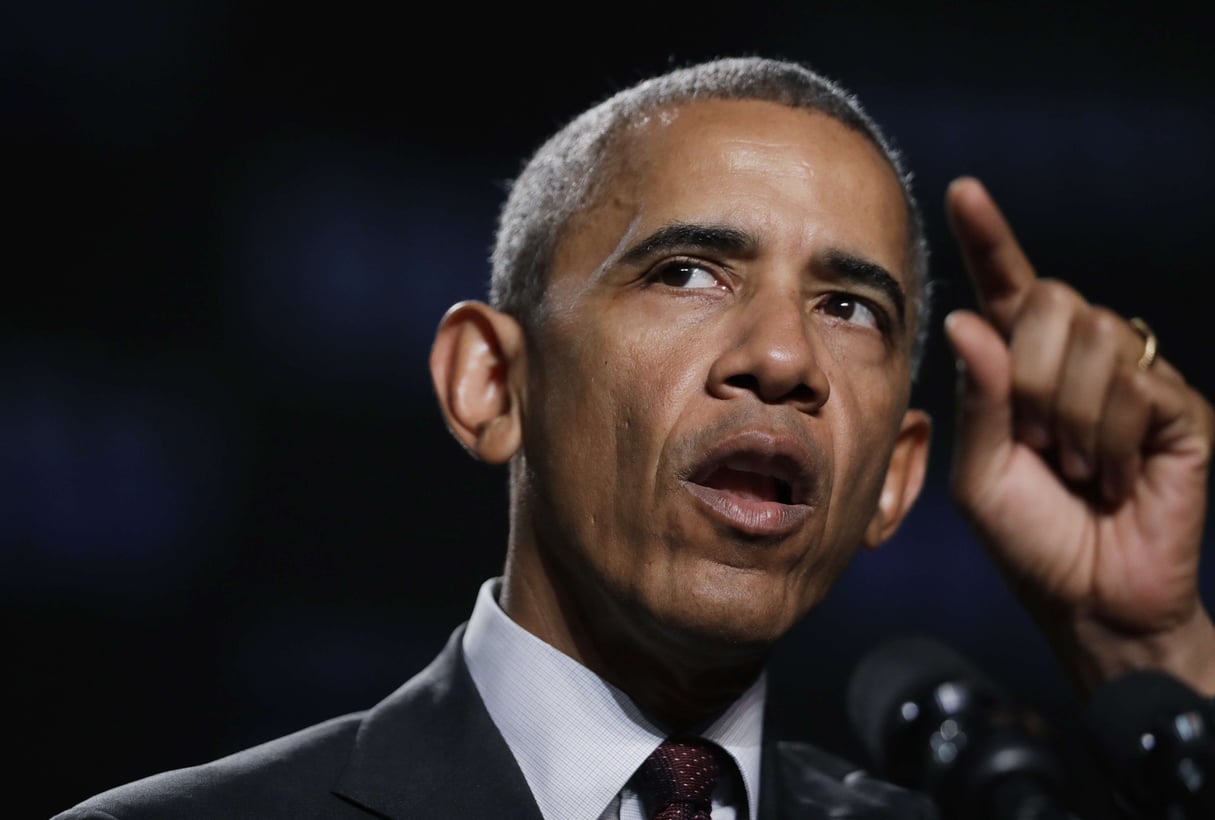
He said wealth gaps and a complex modern economies had left people feeling “as if they don’t have control, and they feel as if their politicians often don’t have control over all the different forces there.” And he said social media was “very good at making people fearful of or angry about those who don’t agree with them.”
“We haven’t figured out, all right, what are the new forms of participation that can engage people and make them feel empowered so that when they act, it’s going to make a difference for them and their families,” he said.
And he suggested authoritarians operate “just by breaking things” instead of building new alternatives to the systems they decry.
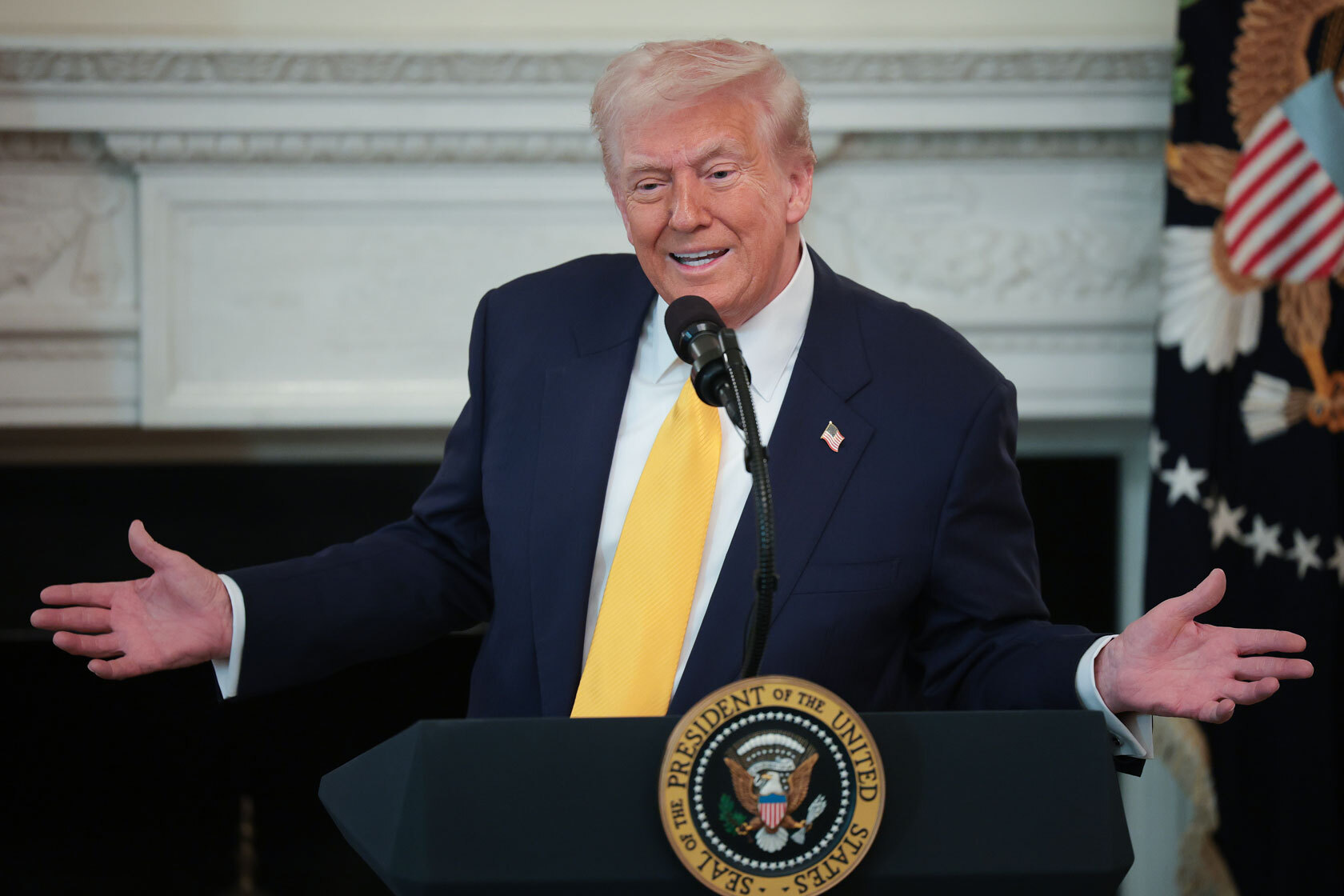
“They can tear things down, remove constraints on their actions, and empower themselves in a small group,” he said. “In terms of being able to solve some of the big problems around health care or education, there, not so much, because that does require creating new structures. It’s not just a matter of getting a cut, taking a piece of whatever is being done and making sure your friends are rewarded and your enemies are punished.”
![]()
Obama’s Chances at a Third Term? A Constitutional Dead End

This is an interesting question, but it is crucial to clarify that Mr. Barack Obama has no opportunity to run for the U.S. Presidency again, according to the Constitution.
The Constitutional Bar: Why Obama Cannot Run Again
- The 22nd Amendment to the U.S. Constitution clearly stipulates that an individual can only be elected President for a maximum of two terms (totaling 8 years).
- Mr. Obama completed two full terms as President (from 2009 to 2017). Consequently, he is bound by this law and is not eligible to run in any subsequent Presidential election.
Hypothetical Success Factors (Should He Be Eligible)

However, if one were to assume the 22nd Amendment did not exist or he was somehow permitted to run, the factors and reasons that would make him likely to succeed, based on his career and public image, would be:
- Personal Appeal and Oratory Mastery: Obama is renowned for his superb rhetoric, his ability to inspire, and his capacity to connect with voters, particularly younger demographics and minority groups.
- Policy Legacy:
- The Affordable Care Act (Obamacare): A major, albeit controversial, achievement that provided health insurance to millions of Americans.
- Economic Recovery: He inherited an economy in the throes of the Great Recession and oversaw a recovery that steadily brought down unemployment.
- Foreign Policy Highlights: The killing of Osama bin Laden, the Iran nuclear deal (JCPOA), and the “pivot to Asia” stand out as key moments.
- Status as a Symbol of Change: As the first African American President, he remains a potent symbol of progress and diversity, commanding strong support within the Democratic base.
- Experience and Trust: As a two-term former President, his experience in running the country is unmatched, lending him a high degree of credibility.
Conclusion
In reality, Mr. Obama has no chance of running for a third term due to the constitutional limitation. Any discussion of his chances of success is purely hypothetical, based on his strong public standing and track record. Currently, he continues to play a vital role within the Democratic Party as a major endorser, advisor, and campaigner for other candidates.
![]()
When the White House gets salty: Trump, Biden and presidential profanity
Blue language at the White House is rare, but it’s not the first time Trump has deployed that specific expletive to vent his annoyance over diplomatic challenges
In June, following the news Israel and Iran violated a temporary ceasefire agreement brokered by the US, Trump told reporters on the White House South Lawn, “We basically have two countries that have been fighting so long, and so hard, that they don’t know what the fuck they’re doing.”
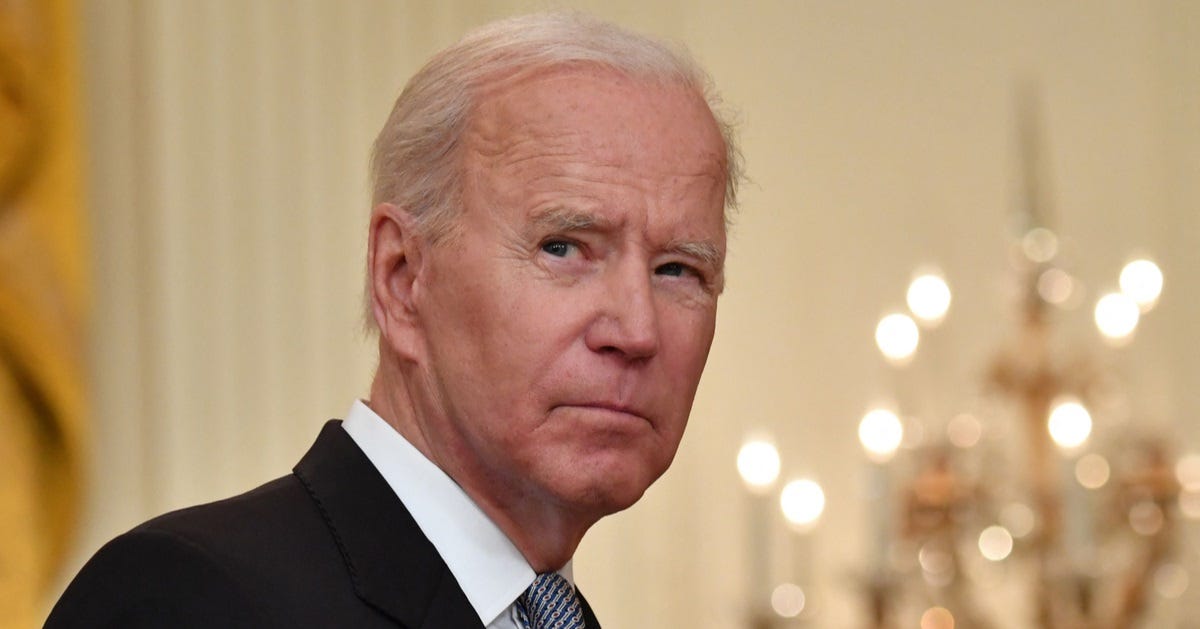
Trump has shrugged off many norms as president, and often used coarse or politically incorrect language, both as president and as a presidential candidate — in 2018, he decried immigrants coming to the US from what he called “shithole countries,” behind closed doors, later using the same curse to describe the District of Columbia during a 2024 campaign rally in Iowa.
But he’s hardly the first prominent politician to deploy the f-word or other expletives from their off-color arsenal in public.
Trump’s predecessor, Joe Biden, raised eyebrows when, during a 2010 press conference with then-President Barack Obama, he was caught telling Obama passage of the Affordable Care Act was a “big fucking deal.”
Democrats later used the gaffe to raise money for the Democratic National Committee.
Later, as president, Biden was again caught on a hot mic calling a reporter in the White House press pool “a stupid son of a bitch,” for asking a question he didn’t like, though he later called the reporter to apologize.

Obama too raised eyebrows when, during an off-the-record portion of a 2009 interview with CNBC, he called rapper Kanye West “a jackass” after West rushed the MTV stage during Taylor Swift’s speech accepting the award for best female music video of the year.
And in 2004, then-Vice President Dick Cheney told Vermont Sen. Patrick Leahy to “go fuck yourself” on the Senate floor during Senate picture day after Leahy accused the vice president of war profiteering.
Using profanity on the Senate floor is against the chamber’s rules, but Cheney skirted a violation because the Senate was not in session, a Senate official told CNN at the time.
![]()
Millions rally against Trump at ‘No Kings’ protests across the US, organizers say. Here’s why protesters say they attended
To celebrate her 70th birthday, retired government worker Peggy Cole says she and a friend drove nearly 10 hours from her hometown of Flint, Michigan, to join a protest in Washington, DC, on Saturday.
Cole said she felt compelled to mark the milestone at the large demonstration because it’s a “scary time” for Americans and democracy is at stake.
“It seems to me, (Trump is) taking our government, our democracy, and dismantling it piece by piece, slowly, but surely, if we sit by and don’t do anything about it,” Cole said.
The event was one of more than 2,700 “No Kings” rallies held across the country on Saturday, protesting what organizers describe as President Donald Trump’s “authoritarian” agenda. That’s hundreds more events than were planned for the first go-round in June, when about 5 million people across the country took to the streets to protest Trump’s administration as he held a military parade in Washington.
Nearly 7 million people showed up for Saturday’s rallies – including more than 100,000 people in New York, organizers and officials said. Along with larger events in major cities, small pockets of “No Kings” protesters cropped up along busy thoroughfares, in small town squares and at municipal parks in red and blue states alike.

The largely peaceful protests followed a tumultuous summer of mass immigration raids, demonstrations against federal immigration enforcement and the deployment of federal troops into Democratic-led cities.
Police in Portland and New York City reported that the protests concluded with no arrests.
Trouble came later in the day when some individuals targeted protesters: A woman in South Carolina was arrested for brandishing a firearm while driving near a demonstration and a man in Georgia was seen on video taking a protester’s flag and pushing another demonstrator to the ground.
While the Trump administration and some GOP officials have painted anti-Trump protests as the work of “violent left-wing radicals,” the organization behind the “No Kings” events, the Indivisible Project, says it is committed to “nonviolent action” and had trained tens of thousands of people in safety and de-escalation. That became especially important amid growing political violence across the country, some organizers said.
Some demonstrators wore yellow – a symbol of unity and a reference to other nonviolent resistance movements, according to organizers. “Yellow is a bright, unmistakable reminder that millions of us stand together in the belief that America belongs to its people, not to kings,” reads a flyer on the “No Kings” website.
Other protesters wore costumes, including inflatable chickens, frogs and dinosaurs, which some said emphasized the peaceful nature of the demonstrations. “It’s really hard to call something a war zone, when you look at something and it’s just a block party and people in Halloween costumes,” said a Los Angeles protester who wore a unicorn costume as he danced to music.
Protesters could be heard loudly cheering and chanting slogans into megaphones, including, “This is what democracy looks like,” and “No hate, no fear, immigrants are welcome here.” They waved American flags along with signs opposing ICE, authoritarianism and billionaires.
CNN field teams spoke with attendees at rallies across the country. Here’s what protesters had to say:
‘We can all save democracy’
Many protesters emphasized the importance of democracy – an institution they fear is eroding with Trump’s attempts to expand executive power.
“We’re a democracy. And that, in a democracy, people can stand up and voice their opinions. And that we are not going to be silenced,” Joan Press told CNN at a protest in Atlanta.
A rally that kicked off the Atlanta protest featured high-profile speakers, including Democratic Sen. Raphael Warnock of Georgia.

“In this moment, in which we are seeing a president and an administration arrogating to himself power that doesn’t belong to him, our message is very clear,” Warnock later told CNN. “This is not about the people in power, it’s about the power in the people.”
Kimberly Diemert, an organizer and communications director for the Georgia chapter of 50501, a “decentralized” movement that has helped lead the wave of nationwide protests, reminded the crowd about the city’s civil rights legacy.
“Atlanta is the cradle of the Civil Rights Movement as well as democracy … we don’t want to lose that,” Diemert said.
In New York City, one demonstrator held a sign reading: “We protest because we love America, and we want it back.”
The protester, who asked not to be named for privacy reasons, said she’s been protesting since the 1960s, but this time feels different.

“In the 60s we wanted to expand rights – women’s rights, gay rights, minority rights, voting rights,” she said. “But all that’s being taken away now. Now our entire democracy is being threatened, the basic tenets, the press, the judiciary.”
She described feeling “very sad, a sense of loss, fear” under the Trump administration.
“I’m hoping together, we can all save democracy,” she said.
Dressed in Revolutionary War-era clothing and wigs, members of the group All in for Democracy attended the “No Kings” protest in Washington, DC.
“I just see all of our institutions changing, and I don’t want us to change as a country and as a people,” said DC resident Lee Ayres, sporting a coat, wig and hat. “I want all of America to realize the Declaration of Independence is about no kings.”
‘Our free speech is frightening’
Many demonstrators called out what they feel is a threat to freedom of expression in the US.
“It doesn’t seem like we’re able to peacefully or safely (express ourselves) right now, without fear of repercussions” from the government, work or families, said Bobbie Castillo, who traveled hours from her hometown of Lincoln, Nebraska, to DC for her first protest ever.
Bill Nye, “The Science Guy,” rallied the crowd at the DC protest, arguing that Trump and his associates “cannot tolerate dissent.”
“To them, our free speech is frightening. They are arresting people and denying due process in courts. They tried to silence television hosts,” Nye, a former TV host, said.
Participants in smaller cities and towns said they were struck by the size of the turnout Saturday.
In Ashland, Oregon, Joel Lesko said the day was about “joyfully celebrating our love for America, for free speech, for the importance of community and using our voices for diversity and inclusion and democracy.”
After attending a protest in ruby-red Hendersonville, North Carolina, author Lynn Ames told CNN, “If you love this country, saving democracy is a priority no matter where you live, including in small-town America. Maybe especially in small-town America.”
Immigration raids and National Guard deployment
Many protesters connected their attendance to the ongoing immigration crackdown and the federal government’s forceful response to anti-ICE protests that first erupted in Los Angeles following local raids. The demonstrations have since spread to numerous other cities, including Chicago, New York City, Dallas and Portland.
Trump’s attempts to deploy the National Guard to Democratic-controlled cities – which he argues is necessary to quell violence and support his deportation initiatives – have drawn legal challenges by state and local officials.
Demonstrators in Los Angeles – where federal immigration raids triggered massive protests in June and led to Trump sending in the National Guard against Gov. Gavin Newsom’s wishes – emphasized rights for immigrants and called for a stop to the Trump administration’s deportation campaign.
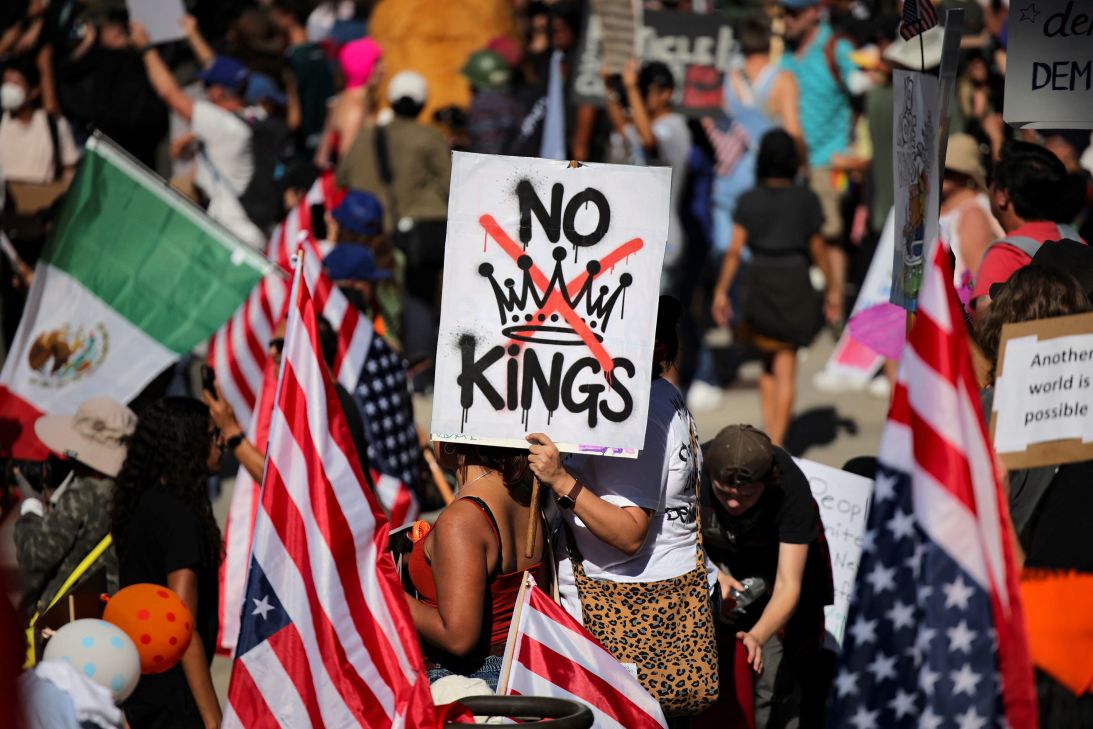
Sitting in front of LA’s City Hall, Gilberto Beas told CNN the protest is “a message for ICE to stop doing what they’re doing.”
Maria Rivera Cummings, who was born in Los Angeles and is of Mexican descent, said: “We’re all immigrants and everyone has rights here.”
At a demonstration in DC, Michael Langfeldt said he was protesting what he sees as “hatred” toward immigrants and the deployment of the military to US cities.
“I feel like there’s a lot of overreach in the federal government, specifically in like the executive branch,” he told CNN. “Congress doesn’t do anything about it.”
Hailey, a 24-year-old demonstrator in an inflatable frog suit, told CNN that she was inspired by demonstrators in Portland, who have faced off against federal law enforcement for weeks. Protesters there have donned inflatable costumes at rallies outside an ICE facility — in part to dispute Trump’s characterization of the city as “war-ravaged.”
“I think it’s hard to see a country that you love descend into fascism,” Hailey told CNN.
In Chicago, which has been an epicenter for the resistance to Trump’s sweeping immigration crackdown, many carried Mexican flags and signs like “Hands off our Democracy” and “ICE OUT!”
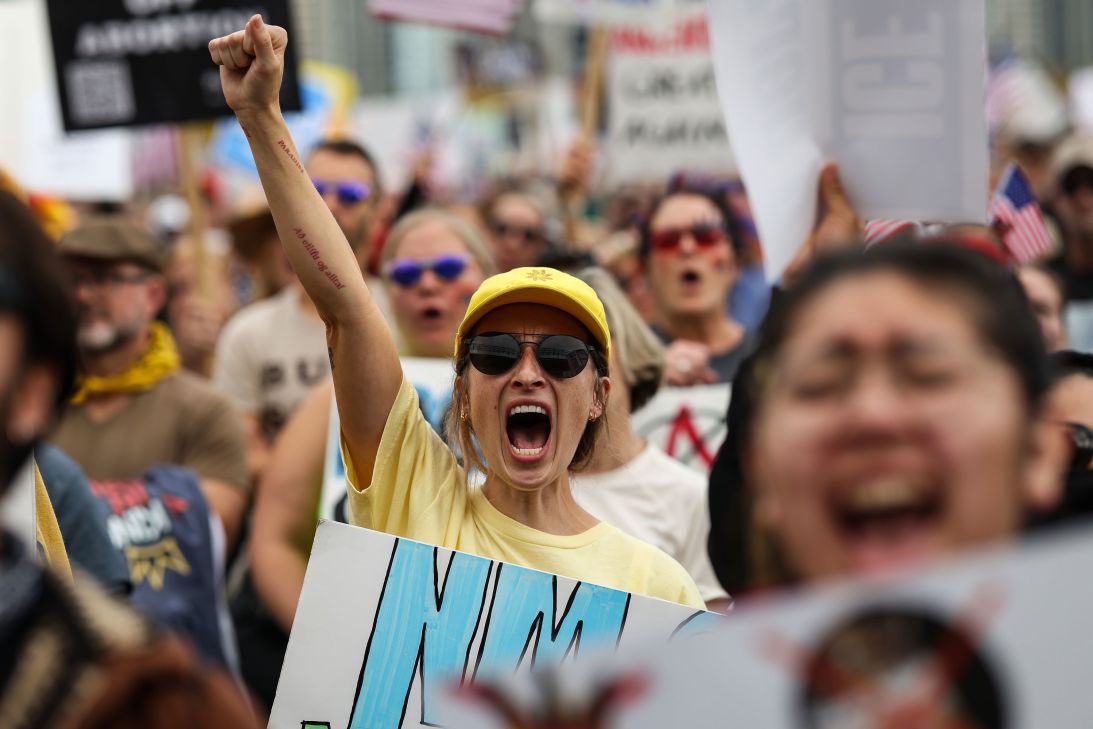
Actor John Cusack, a Chicago resident known for being outspoken about Hollywood and the US government, said the city’s message to the Trump administration is: “Go to hell!”
“No, you can’t put troops on our streets. You can’t create enough chaos to invoke the Insurrection Act so you can stay in power,” the actor said, addressing the president.
Dakota Englert, from Coal City, Illinois, said she came to stand up for basic humanity.
“We all bleed the same color … I feel for the people that are being separated from their families, the people that are being hurt, killed,” Englert said.
Cuts to federal programs
Other protesters expressed concerns about cuts to federal programs — particularly health care. The protests come as the federal government is shut down, with GOP lawmakers and the White House locked in a standoff with Democrats over a funding bill.
Danielle Guinto, a mother of two, said she worries about the major federal changes to Medicaid and other health-related policies that could impact her children’s health, as well as the rising cost of living.
“I just don’t understand how you can rip food out of people’s mouths, how you can separate, rip people out of their homes,” she told CNN at the Chicago demonstration. “How can you look at a family with fear in their eyes and you’re just going to go take them away?”
Anthony Lee, who works at the Food and Drug Administration and was one of many federal workers who were furloughed following the shutdown, said he came to the demonstration to protect public services. Lee, president of the National Treasury Employees Union chapter in DC, attended the event with a group of unionized federal workers.
“I’ve been a public servant for over 20 years, and to see the destruction, really, of our government, our public services, over the last several months has been really scary,” Lee said.
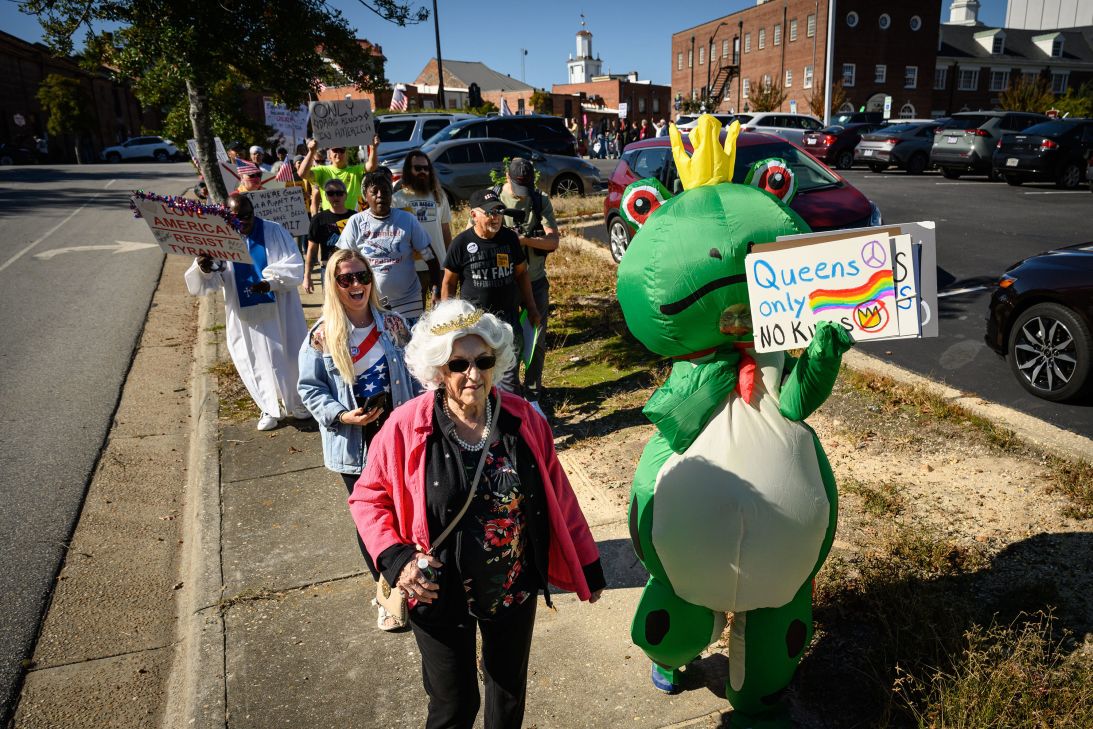
Another federal government employee who was furloughed said she joined the DC protest because the Trump administration has affected her livelihood and “demonized” federal workers.
“The elimination of all these jobs are creating mass threats (for people to be able) to keep their home, to keep a roof over their head, send their kids to college and the hope of the American dream,” said Monica, who declined to share her last name out of fear of retaliation.
Elizabeth Nee, a 25-year-old social worker from Maryland, told CNN she’s seeing an impact at the psychiatric hospital she works at in Baltimore.
“We have a lot of people who are coming in and they’re unhoused, a lot of people on Medicaid. Everything’s at risk right now,” she said.
Speaking at the DC protest, Sen. Bernie Sanders called out Trump and his billionaire allies, like Elon Musk, Jeff Bezos and Mark Zuckerberg.
“This moment is not just about one man’s greed, one man’s corruption or one man’s contempt for the Constitution,” Sanders said. “This is about a handful of the wealthiest people on Earth who, in their insatiable greed, have hijacked our economy and our political system in order to enrich themselves at the expense of working families throughout this country.”
CNN’s Veronica Stracqualursi, Zoe Sottile, Rebekah Riess, Alaa Elassar, Tori B. Powell, Emma Tucker, Danya Gainor, Julia Vargas Jones, Shimon Prokupecz, Sarah Moon, Rafael Romo, Whitney Wild, Bill Kirkos, Don Riddell, Brian Todd, Julian Silva-Forbes and Sarah Dewberry contributed to this report.









































:max_bytes(150000):strip_icc():focal(999x0:1001x2)/catherine-ohara-013026-7-4b5b413a646d4f15a1fd15ac8b933811.jpg?w=1200&resize=1200,0&ssl=1)








